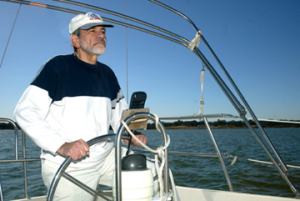In engineering, many discoveries that improve the quality of life do so in unseen ways, but alumnus Fred Gentile’s (1961 BSEE) development is in everyday use across the world. It’s even easy to spell—ATM, Automated Teller Machine.
“I was the development manager for Docutel Corporation, where a friend of mine developed the first basic ATM,” Gentile said. “I developed the networks that tie the ATMs together. My goal was to put the number of things tellers do online.”
Gentile has a patent in networked automatic banking systems with networks. His interest in ATMs grew from a personal desire for expediency.
“I hated writing checks at a grocery store to get some cash if the bank wasn’t open,” Gentile said. “It’s a convenience that started a revolution. We have a lot of things now that are similar. You can get your boarding pass for a flight without talking to anyone. You can get your money out of the bank using these automatic terminals when you’re in a hurry, and no one has to help you.”
Though the development work was both creative and technical, Gentile said that his engineering degree was invaluable.
“Engineering gives you your background and the ideas to build on,” Gentile said. “You’re learning from what you were taught in science, and you’re applying it to real day-to-day applications. Engineering makes all the difference in the world.”
In addition to his work with ATMs, Gentile created Automated Fuel Dispensing Systems that are seen at gas stations everywhere and has a co-patent for that design.
“It was the same group of us that had worked on the ATMs, and it was working so well that we looked for other places to apply similar technology,” Gentile said. “We were investigating the possibilities, and a large oil company asked if we were interested in building systems for them. They supplied the pumps, we supplied the computers and electronics, and we did it in 115 days. After that, they gave us a contract to build 75 systems.”
Though they completed the ATM networking system within a year and the Fuel Dispensing System even faster, with today’s technology the turnaround would be much faster.
“In those days you didn’t have a CompUSA where you could buy a computer ready to go,” Gentile said. “You had to put your computer together, and there were a lot of obstacles in getting the software written and selecting the right equipment. We spent long hours working on these things. It took individuals 60 to 80 hours a week to develop them.”
Almost three decades after these initial developments, Gentile can see the progress that other engineers have made with the groundwork his team laid down.
“I was on vacation in Greece when I saw one of the ATMs, and it is quite exciting to see how far everything has gone,” Gentile said. “This is the age of self-service machines, and it was exciting to be in on the part that I was on. The systems seem to be more sophisticated now although they have the same functions. They have better displays available today, and they build a lot more of them. When I was at Docutel, we built 4,000 to 5,000 ATMs and 75 fuel stations. Now there are hundreds of thousands, so you can see how the business has matured.”
After working for NASA, Honeywell and American Airlines in engineering communications and development, Gentile retired, which led him to a new hobby.
“About 10 years ago, I decided I wanted a sailboat, and I’ve been sailing more since I retired,” Gentile said. “I sailed some of the Greek Islands, and we went to Tortola in the British Virgin Islands. I also went to the French Island Martinique. You have to know a little bit about the wind and the configuration of the sail so it’s a bit of an art, but I don’t think it’s very difficult to get highly proficient.”
Though retired, Gentile is also still a member of the Institute of Electrical and Electronics Engineers, IEEE. He has been involved in the organization for 43 years.
“The interesting thing is as a student you get their publications, and you see what engineering is outside of the academic area,” Gentile said. “I treasured that. After you get out, you see what other people are doing. It keeps you in touch with the rest of the engineering industry.”
